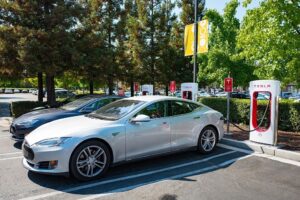The House Energy and Commerce Committee held a hearing on June 22 titled “Driving Affordability: Preserving People’s Freedom to Buy Affordable Vehicles and Fuel.” Lawmakers discussed various legislative efforts that aim to stop President Joe Biden’s supposed federal overreach, from the No Fuel Credits for Batteries Act to the Preserving Choice in Vehicle Purchases Act. Subcommittee on Environment, Manufacturing, and Critical Materials Chair Bill Johnson (R-OH) accused the current administration of releasing a tsunami of regulations that would drastically transform transportation and mobility for the American people “on a timetable that defies reality.” Indeed, if households are struggling to afford an automobile today, they will still find it challenging when Washington ensures that most new cars sold in the future are electric vehicles.
Basic Facts About Electric Vehicles
Today, the average retail price for electric vehicles is nearly $60,000. By comparison, gas-powered cars cost less than $50,000. Of course, this does not take into account the federal or state tax credits that trim the price tag and bribe consumers with their own money to purchase a type of automobile that the government endorses. But proponents say that motorists should dismiss the upfront cost of EV ownership and assess the long-term costs. Suffice it to say, this argument does not work either, especially when determining the most fundamental component of any car.
Industry experts note that the service life of an electric car battery is between eight and 12 years. This is far superior to the typical vehicle battery that will generally last three to five years. The problem? Be it battery degradation or an ineffective installation, EV battery replacements can be as high as $20,000. Once again, by comparison, the typical car battery price can go as high as $1,000. So, even if the EV battery lasts longer, drivers will still be spending more.
Now, the key attractive advantage of electric vehicles over gas guzzlers is the gasoline cost.
For the most part, charging an EV is approximately three times cheaper per mile than fueling a gas-powered sedan. But would this be accurate forever? Environmentalists aim to have everyone drive an EV in the future as gas-powered vehicles will be gradually outlawed from civilization. The challenge is the energy demand. Not only would the infrastructure be incapable of handling a dramatic increase in routine charges, especially at peak times, but it would also cost a hefty amount since everyone would be draining the system, requiring more production and consumption of fossil fuels, from coal to natural gas. Let’s face it: solar panels and windmills will not resolve the planet’s energy needs for eight billion people.

(Photo by Smith Collection/Gado/Getty Images).
Another point that critics often allude to is that the energy return on investment, or EROI, is mainly negative. With an EV, drivers will insert more energy than what they receive: EVs are recharged with fossil fuels, battery manufacturing is energy-intensive, and manufacturing EVs require substantial levels of cobalt, lithium, manganese, or nickel. Moreover, because EVs demand plenty of carbon, the environmental and economic benefits of owning electric vehicles are negligible.
This explains why the International Energy Agency (IEA) projects that electric automobiles emit about half as much CO2 as a gas car over its lifetime. Or, why one study learned that EVs produced greater volumes of dangerous particulate air pollution in two-thirds of US states than gas-powered cars. Or this conclusion from an October 2021 Anderson Economic Group paper: “Electric vehicles can be more expensive to fuel than their internal combustion engine counterparts.”
In the end, the only way to make the scheme functional is to subsidize it. This is what governments worldwide are doing, handing out tens of billions of taxpayer dollars to multinational corporations.
Gone in 60 Seconds?
So, will electric vehicles survive and thrive or go the way of Google Glass? Well, automakers are going all in on EVs, with Elon Musk leading the charge. His company, Tesla Motors, has done a superb job of lowering the cost of his suite of EVs. There is little reason why these businesses cannot do even more in the future. That said, Bjorn Lomberg, the president of the Copenhagen Consensus and visiting fellow at Stanford University’s Hoover Institution, wrote in a December 2022 piece for the Financial Times:
“Electric vehicles will only take over when innovation has made them better and cheaper than gas-powered cars. But politicians want the change now and are planning to waste hundreds of billions of dollars subsidizing electric cars, blocking consumers from choosing the cars they want, to achieve virtually nothing for the climate.”
If it is wrong to extend subsidies to oil and gas firms, then wouldn’t it be unethical to give billions in taxpayer money to green firms that have failed to alleviate consumers’ financial agony over the last few years? Not really, because the world is following the Book of ESG, and the chief tenet of this religion is to worship environment, social, and governance policies no matter what.
All opinions expressed are those of the author and do not necessarily represent those of Liberty Nation.
Do you have an opinion about this article? We’d love to hear it! If you send your comments to [email protected], we might even publish your edited remarks in our new feature, LN Readers Speak Out. Remember to include the title of the article along with your name, city, and state.
Please respect our republishing guidelines. Republication permission does not equal site endorsement. Click here

